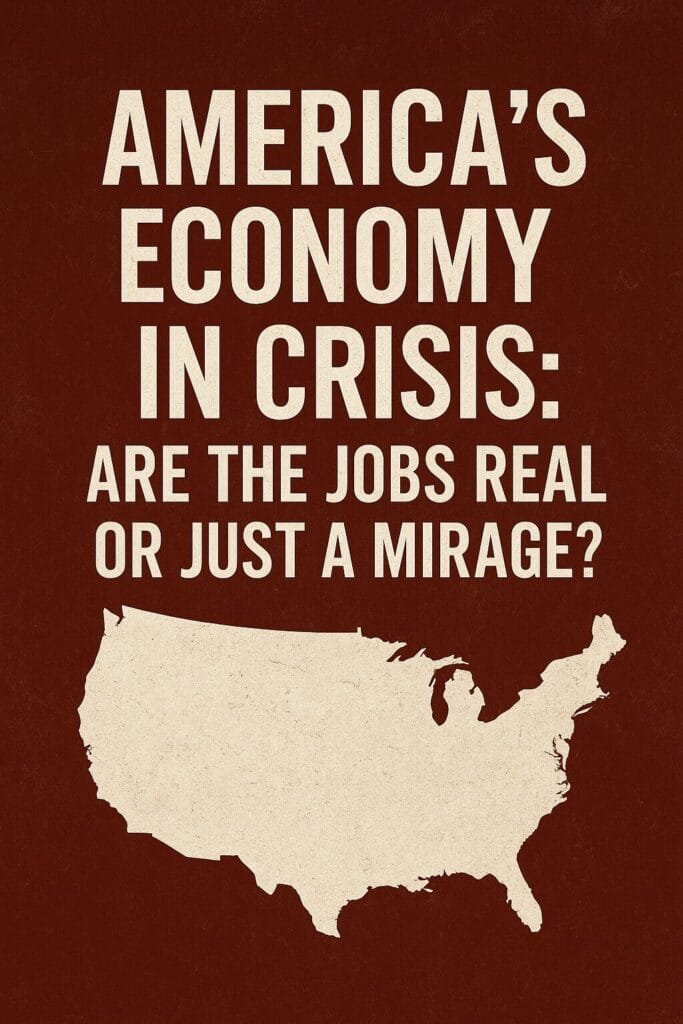Also Read : Can the U.S. Citizens who are Unemployed get Loans : 2025
In early 2024, it was announced that had an earthquake-level effect on both financial markets, political groups and even individual households: the U.S. Bureau of Labor Statistics (BLS) had allegedly inflated employment data by more than 800,000 jobs since March. To a nation that was already dealing with inflation, runaway debt, and question of which aspects of our economy(US Economy in Crisis) are real and which are merely smoke and mirrors, this disclosure brought up a serious question, what are the real things in our economy, and what are mere smoke and mirrors?
This blog further unravels what, why and how much this could mean to ordinary Americans and does US Economy in Crisis.
The BIG Reveal: Job Numbers were too good to be true
Month after month, the official reports gave a bright picture of the labor market. There were headlines of hundreds of thousands of new jobs being created. These reports were used by politicians as a sign that the economy was very strong and robust. By the end of summer, however, revised figures spoke otherwise: such gains in employment were not real. The economy had not been generating the opportunities as it had claimed it was generating.
That revision revealed that approximately 818,000 jobs were simply created with seasonal adjustments, flawed surveys, or optimistic assumptions. To bring that figure into perspective, it is as though that whole population of Seattle had been suddenly placed on the payroll–when really they had not.
Why are Numbers Inflated?
Other economists claim it was not an evil deed, but simply a demonstration of how hard it is to gauge employment in a post-pandemic, shifting economy. Another group of people tells a darker story: that it was to massage the numbers to keep consumer confidence high and prevent panic in an election year.
The following are some of the reasons why this may have occurred:
- Political Incentives: The main argument of every administration is to have a high job growth. Artificially inflated figures create an image of stability.
- Wall Street Tension: Markets are very sensitive to job statistics. Positive news will allow investors to relax, even temporarily.
- Lagging Data Collection: Government surveys are typically behind in capturing such trends as remote work, gig economy employment, and self-employment changes.
Whatever the cause, the effect is similar, the Americans were fooled.
What Does this Mean to the Common Man?
What may be troubling you as an average worker or small business owner in the United States is,
- “So what? How does this affect me?”
1. Remains Sticky – Fake jobs growth indicates economy is in better position than it truly is which can leave the Federal Reserve reluctant to reduce rates. That implies more lengthy credit card, mortgage, and loan payments.
2. Job Market Confusion – A lot of individuals believe that the process of job hunting is more difficult than it is portrayed in headlines. When the number of the jobs was overstated then that gut feeling was correct.
3. Lost Confidence – Once citizens stop believing government numbers, there is no trust left in Social Security or the tax policy.
4.Unstable Market – Stock markets survive on the certainty. When numbers are not reliable, the volatility level is elevated which exposes retirement accounts and investments to risk.

The Echoes of the Past: This is not the First Time
It is not the first time that the number of jobs has been a controversial issue. It has been common in the past recessions to revise downward after the economy has been reported to be stronger. However, this error is almost a million jobs so it is notable.
Critics cite this fake jobs revelation as evidence that Washington is playing with the figures to keep the people in check. Proponents of the system retort that revisions are an ordinary aspect of statistical reporting, and do not necessarily indicate fraud. Nevertheless, the fact that these revelations were revealed during an election cycle makes the concerns of many people questionable.
The implication of this on the 2024 Election
To politicians, jobs reports are not statistics, but armaments. As the news about hundreds of thousands of jobs being inflated leaks out, the fight over who is capable of correcting the economy is going to heat up.
- To the incumbents, it becomes a nightmare. They will not be able to boast about winning the economy without being accused of being dishonest.
- To devastators, it becomes ammunition. They can say that the actual economy is worse than what the administration is peddling.
Put simply, this scandal has the potential to turn the tide in swing states where employment and wages rank among the biggest issues among voters.
Can We Still Trust the Numbers?
Erosion of trust is one of the most distressing issues about this revelation. And if the government is wrong or misleading concerning as fundamental a thing as job creation, what is being misreported? GDP growth? Inflation figures? Debt levels?
Other analysts are demanding greater openness of the methods of collecting and reporting jobs data. Others suggest that the private sector, via payroll processors and business surveys, can now be better truth tellers than the BLS.
What Should Americans Do?
You may not be able to control the official numbers but you can control your preparation.
- Do Not Trust what You Read in Headlines – Learn more about financial news, not only government press releases.
- Focus on Your Household Economy – It is inflation, employment stability, and debt that are more important to your everyday life than the numbers on your balance sheet.
- Alternate Income Sources – When the job market is not as good as claimed, having more than one income stream (freelance, side hustles, investments) acts as a buffer.
- Pay Debt to Equity – When the interest rates remain high, debt reduction should be considered a priority.
- Be Politically Active – Keep leaders on their toes regarding the economy. Numbers are not a political toy.
The Bigger Picture
The economy of America is not falling apart in a day, but this episode demonstrates how shaky the credibility of the system is. Once they find that almost a million jobs becomes a phantom gains, then the whole discussion on growth, prosperity and opportunity is marred.
The fact is that most Americans did not need an official government report to tell them something was wrong. Increased grocery prices, high housing costs and low pay increases were already telling the tale. The bogus employment statistics simply proved what citizens had assumed: the economy was not as robust as Washington was proclaiming.
Final Thoughts
Was this an error or a hoax, one thing remains clear, Americans need to be told the truth about the health of their economy. Unless we can trust the numbers, we can not trust the policies made on the basis of them.
The U.S. has had recessions, depressions and crises in the past– and recovered. Truth is how we begin to recover. Until that time, Americans are left wondering: If the jobs were fake, what is?
Follow Us : youtube


